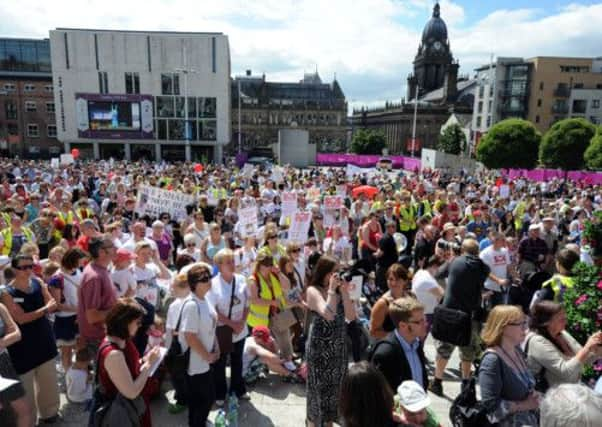Judge is urged to save Leeds children’s heart unit


A High Court judge is being asked to rule that the consultation process which led to the changes, including proposals to close the heart unit at Leeds General Infirmary, was “procedurally flawed”.
Campaign group Save Our Surgery (SOS), which represents a large number of residents in the Leeds area, says an unfair consultation process left consultees “shooting in the dark” and should be rerun.
Advertisement
Hide AdAdvertisement
Hide AdThe legal challenge stems from a decision last July by the Joint Committee of Primary Care Trusts (JCPCT) that paediatric cardiac surgery should be concentrated at fewer, larger sites to improve standards across the country.
JCPCT lawyers say the consultation process was fair and all relevant considerations were properly taken into account when it took its decision.
The chosen sites are at Bristol, Birmingham, Liverpool, Newcastle, Southampton and two London centres.
Children in the Leeds area will have to travel to Newcastle or Liverpool for surgery.
Advertisement
Hide AdAdvertisement
Hide AdThe Leeds unit faces closure along with Leicester’s Glenfield Hospital and London’s Royal Brompton. The Brompton has already lost its own legal challenge to the proposals.
Philip Havers QC, appearing for SOS, said today that nearly 600,000 people had signed a petition against the Leeds closure.
He told Mrs Justice Nicola Davies, sitting at London’s High Court, the consultation process was unfair because the JCPCT denied consultees the chance to question how the quality of their services had been assessed.
Mr Havers said the Kennedy Panel, a group of experts set up to advise the JCPCT, had produced “sub-scores” measuring the quality of service under various criteria.
Advertisement
Hide AdAdvertisement
Hide AdBut the JCPCT chose only to look at the panel’s total scores, and “bizarrely” refused to disclose the sub-scores to consultees, although it made them available “almost immediately” after it made its decision on how heart surgery services were to be reconfigured.
Mr Havers said: “It begs the question why not disclose the information before the decision was taken so that the consultees could comment on the scores?
“If your public duty is to make such information available to consultees you cannot avoid that obligation by saying you won’t look at it yourself.”
Mr Havers said: “There were points which Leeds could, and would, have undoubtedly made about how the Kennedy Panel had scored them.”
Advertisement
Hide AdAdvertisement
Hide AdIt would also have commented on the scoring “as between Leeds and Newcastle”.
The result of not giving centres any clue how the panel scored various criteria was that centres were “shooting in the dark” when it came to consultation, he said.
The JCPCT, having refused to look at the sub-scores itself, was also “assessing in the dark”, said Mr Havers.
Before today’s hearing, expected to last two day, Sharon Cheng, from SOS, said: “Taking legal action has always been our last resort option, pursued only after all other appeals to review the decision were rejected by the JCPCT.
Advertisement
Hide AdAdvertisement
Hide Ad“At the end of the day, this is about protecting the lives of children and this is why we believe that the challenges to NHS officials should be heard.”
The former national clinical director for heart disease and stroke, Sir Roger Boyle, who was one of the experts advising the review, says the NHS made the right decision and that Leeds General Infirmary would continue to play a vital role providing cardiology services to children.
Dinah Rose QC, appearing for the JCPCT, said the suggestion that the sub-scores were the key to understanding the assessments was “wrong”.
Consultees were given sufficient information “to respond intelligently” in the consultation process.
Advertisement
Hide AdAdvertisement
Hide AdMs Rose submitted: “Provision of the sub-scores is not going to give them extra information”.
The judge suggested there had been “a paucity of information” emanating from the Kennedy Panel, but Ms Rose said she did not accept that.
“Leeds knows perfectly well what was being assessed and what decisions were being made.”
The hearing continues tomorrow.